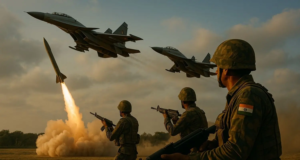The Devastating Economic Impact of War
Wars have a profound and far-reaching impact on the global economy, leaving behind a trail of destruction and instability. The costs extend far beyond the immediate battlefield, significantly disrupting economic growth and stability.

Direct Costs of War
The most immediate and visible costs of war include massive military expenditures. Governments divert significant resources towards funding armed forces, procuring weapons, and maintaining military infrastructure. These expenditures divert resources from crucial sectors like education, healthcare, and infrastructure development, hindering long-term economic growth.
Furthermore, wars cause widespread physical destruction. Infrastructure such as roads, bridges, factories, and homes are often destroyed, crippling economic activity and hindering the movement of goods and people. The loss of human life and the displacement of populations exacerbate these challenges, further disrupting economic productivity.
Disruptions to Trade and Supply Chains
Wars severely disrupt global trade and supply chains. Conflicts often lead to the closure of borders, restricting the movement of goods and services. The destruction of transportation infrastructure, such as roads, railways, and ports, further impedes the flow of goods. Moreover, the displacement of workers and the disruption of production processes can lead to shortages, price increases, and even economic recession in affected regions.
Impact on Investment and Growth
The uncertainty and instability caused by war deter investors. The fear of conflict, property damage, and political instability discourages both domestic and foreign investment. This decline in capital inflows significantly hampers economic growth, as businesses are unable to access the necessary resources for expansion and innovation.
Human Cost and Economic Burden
The human cost of war is immeasurable. The loss of life and the displacement of populations have a devastating impact on the economy. The loss of skilled workers and the disruption of social structures can significantly reduce productivity and hinder economic development. Additionally, the costs of healthcare and social services for war-affected populations can place a significant burden on public finances.
Geopolitical Consequences
Wars can have significant geopolitical consequences that further impact the global economy. The rise of protectionism and trade barriers in the aftermath of conflicts can disrupt global trade flows and hinder economic growth. Regional conflicts can also lead to geopolitical instability, increasing uncertainty and discouraging investment.
In conclusion, wars have a profound and devastating impact on the world economy. The direct costs, such as military expenditures and infrastructure damage, are substantial. However, the indirect consequences, including disruptions to trade, investment, and economic growth, can be even more significant. The human cost of war, including the loss of life and the displacement of populations, further exacerbates the economic burden. Preventing wars and promoting peaceful conflict resolution are crucial for ensuring global economic stability and prosperity.










